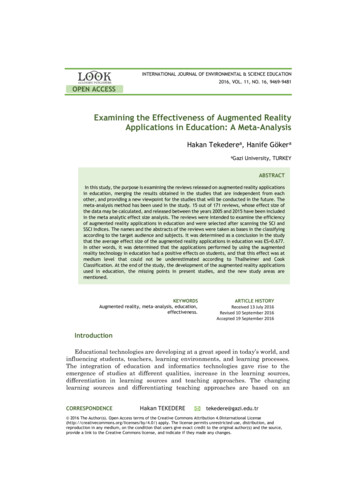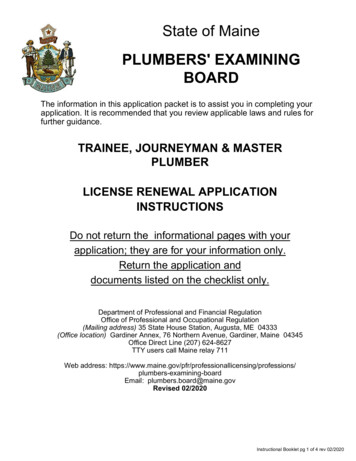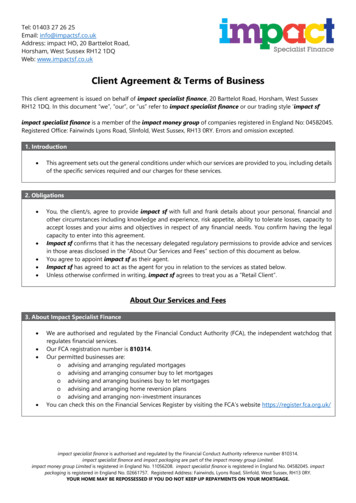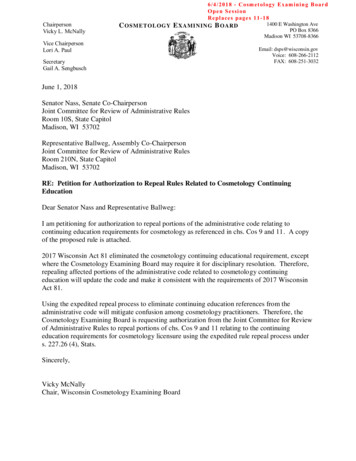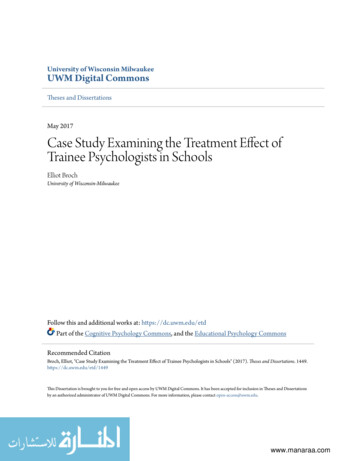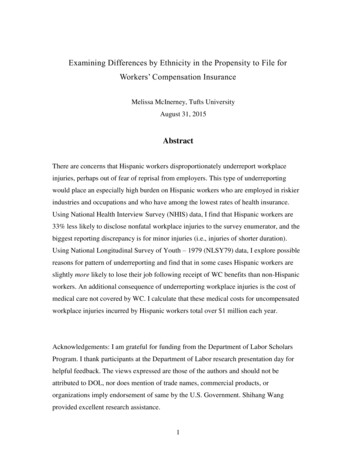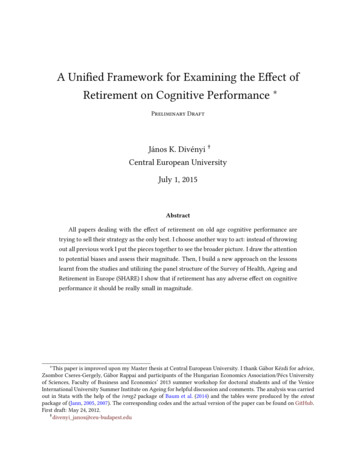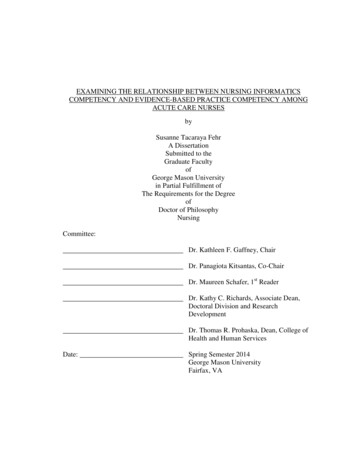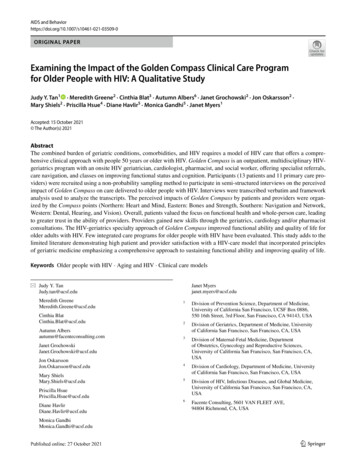
Transcription
AIDS and ORIGINAL PAPERExamining the Impact of the Golden Compass Clinical Care Programfor Older People with HIV: A Qualitative StudyJudy Y. Tan1 · Meredith Greene2 · Cinthia Blat3 · Autumn Albers6 · Janet Grochowski2 · Jon Oskarsson2 ·Mary Shiels2 · Priscilla Hsue4 · Diane Havlir5 · Monica Gandhi5 · Janet Myers1Accepted: 15 October 2021 The Author(s) 2021AbstractThe combined burden of geriatric conditions, comorbidities, and HIV requires a model of HIV care that offers a comprehensive clinical approach with people 50 years or older with HIV. Golden Compass is an outpatient, multidisciplinary HIVgeriatrics program with an onsite HIV geriatrician, cardiologist, pharmacist, and social worker, offering specialist referrals,care navigation, and classes on improving functional status and cognition. Participants (13 patients and 11 primary care providers) were recruited using a non-probability sampling method to participate in semi-structured interviews on the perceivedimpact of Golden Compass on care delivered to older people with HIV. Interviews were transcribed verbatim and frameworkanalysis used to analyze the transcripts. The perceived impacts of Golden Compass by patients and providers were organized by the Compass points (Northern: Heart and Mind, Eastern: Bones and Strength, Southern: Navigation and Network,Western: Dental, Hearing, and Vision). Overall, patients valued the focus on functional health and whole-person care, leadingto greater trust in the ability of providers. Providers gained new skills through the geriatrics, cardiology and/or pharmacistconsultations. The HIV-geriatrics specialty approach of Golden Compass improved functional ability and quality of life forolder adults with HIV. Few integrated care programs for older people with HIV have been evaluated. This study adds to thelimited literature demonstrating high patient and provider satisfaction with a HIV-care model that incorporated principlesof geriatric medicine emphasizing a comprehensive approach to sustaining functional ability and improving quality of life.Keywords Older people with HIV · Aging and HIV · Clinical care modelsJanet Myersjanet.myers@ucsf.edu* Judy Y. TanJudy.tan@ucsf.eduMeredith GreeneMeredith.Greene@ucsf.edu1Cinthia BlatCinthia.Blat@ucsf.eduDivision of Prevention Science, Department of Medicine,University of California San Francisco, UCSF Box 0886,550 16th Street, 3rd Floor, San Francisco, CA 94143, USA2Autumn Albersautumn@facenteconsulting.comDivision of Geriatrics, Department of Medicine, Universityof California San Francisco, San Francisco, CA, USA3Jon OskarssonJon.Oskarsson@ucsf.eduDivision of Maternal‑Fetal Medicine, Departmentof Obstetrics, Gynecology and Reproductive Sciences,University of California San Francisco, San Francisco, CA,USA4Mary ShielsMary.Shiels@ucsf.eduDivision of Cardiology, Department of Medicine, Universityof California San Francisco, San Francisco, CA, USA5Division of HIV, Infectious Diseases, and Global Medicine,University of California San Francisco, San Francisco, CA,USA6Facente Consulting, 5601 VAN FLEET AVE,94804 Richmond, CA, USAJanet GrochowskiJanet.Grochowski@ucsf.eduPriscilla HsuePriscilla.Hsue@ucsf.eduDiane HavlirDiane.Havlir@ucsf.eduMonica GandhiMonica.Gandhi@ucsf.edu13Vol.:(0123456789)
AIDS and BehaviorIntroductionMethodsPeople with HIV are living longer. Worldwide, an estimated7.5 million people with HIV are ages 50 years or older [1].We use the age of 50 to characterize “older” for people withHIV due to the risk of age-related comorbidities and geriatric conditions at younger ages relative to the general population [2–6]. Managing comorbidities and geriatric conditionsrequires specialized treatments that in turn put older peoplewith HIV at risk for other clinical complications, includingdrug-drug interactions [7–9]. Thus, the combined burdenof geriatric conditions, comorbidities, and HIV requiresa model of HIV care that offers a comprehensive clinicalapproach to complex clinical cases [10–13].Golden Compass at Ward 86, a safety-net outpatient HIVclinic, was developed in response to the need for a broadercare approach with older people with HIV (Fig. 1) [14, 15].The Golden Compass multidisciplinary team includes aHIV geriatrician, a cardiologist, a pharmacist, and a socialworker. Additional services include specialist referrals andnavigation; classes on improving functional status and cognition [14, 15].While research has characterized the health care needsof older people with HIV, much less is known regardingthe impact of care programs designed and implemented tospecifically address these needs. The perspectives and preferences of patients and care providers are often missing evenas they should guide the evaluation of care models [16, 17].The goal of this study was to explore the impact of GoldenCompass from the perspectives of both patients and primarycare providers at the Ward 86 HIV clinic using qualitativeresearch methods.ProceduresParticipants (both patients and their primary care providers)were recruited for a one-time semi-structured interview ata metropolitan HIV clinic with 39 providers serving 2400patients, most of whom are on public insurance or are uninsured. Interviews were conducted between October 2018 andMay 2019 by authors JYT, CB, and JM. Non-probabilitysampling was used, resulting in a convenience sample ofthose who were easy to contact and engage. Patients wererecruited via posted flyers and word of mouth; they wereeligible for the study if they were living with HIV, 50 yearsof age or older, and had participated in at least one GoldenCompass consultation or class. Individuals were screenedby phone and, if eligible, were scheduled for an in-person orphone interview. Providers who referred at least one patientto the program were recruited via “Dear Provider” emails.Interviews were conducted in person or via phone or videoconference. Informed consent was obtained prior to theinterview. Interviews were recorded for later transcriptionand each lasted 45–60 min. Participants received a 20 giftcard. Study procedures were approved by the University’sInstitutional Review Board.Separate interview guides were developed for patientsand providers. Interviews among patients explored experiences with Golden Compass and impacts on health. Amongproviders, interviews focused on the referral experience andtheir perspectives on the usefulness of the geriatrics and cardiology consultations, including observed impacts on patienthealth and on the provider’s care approach.Fig. 1 Four compass points ofthe Golden Compass Program,Ward 86, Zuckerberg San Francisco General HospitalNORTHHeart and MindOnsite cardiologist, cogni veassessments by a geriatrician, andbrain health classes for pa ents.WESTDental, Hearing, and VisionAssessments for and referrals tospecialized services.EASTBones and StrengthOnsite geriatric assessments formobility, frailty, and falls, as well asexercise classes (Wellness Club) fors ffness preven on, balance, flexibility,coordina on, and bone health.SOUTHNaviga on and NetworkService naviga on and classes toaddress social isola on andloneliness.13
AIDS and BehaviorAnalysis ApproachInterviews were transcribed verbatim by a professional transcription service as they were completed. Transcripts wereindependently read by authors JYT, CB, JM, M. Greene asthey became available, and interviews were conducted untilthematic saturation was reached (i.e., no new informationwas gained from an additional interview) [18]. Themes wereidentified based on this preliminary reading of transcriptsand were discussed and refined during regular team meetings. Data analysis was conducted separately by patientsand providers via two approaches. First, analytic memoswere developed independently by JYT, CB, JM who readand reread the same set of patient and provider transcriptsand then met to discuss emergent themes and other observations [19, 20]. Next, JYT conducted framework analysis bydeveloping data matrices based on themes by patient andprovider and by which to organize the raw data, allowingcomparisons of quotes across themes and participants [21].These analyses were presented and discussed during regularteam meetings.FindingsA total of 13 patients with HIV and 11 primary care providers were included in the study. Patients with HIV selfidentified as the following: 11 (84.6%) as male, two (15.4%)as female, six (46.2%) as Black/African American, three(23.1%) as “Other”, three (23.1%) as White, two (15.4%)as Latinx, and one (7.7%) as Native Hawaiian/Other PacificIslander. Demographics of primary care providers are notpresented in order to protect the confidentiality of the smallgroup of providers. Below, we first present findings on theoverall experience of Golden Compass by patients and thenproviders. Next, we discuss respective patient and providerexperiences (Table 1) organized by the Compass points(Fig. 1).Overall Impact of Golden CompassPatients felt that Golden Compass resulted in them havinggreater confidence in the quality of care received. Narratives centered on having greater confidence and, as a result,more engagement in their care as a result of participating inGolden Compass. Patients appreciated that their care wasfocused not around disease alone, but around functionalhealth and a full spectrum of needs above and beyond HIV:Dr. [HIV geriatrician], the Golden Compass addresses more than my HIV. [The geriatrician] breaksit down with different doctors that you have to see. My[HIV] doctor does not address the cardiology and withthe bone density and there is more than HIV with myhealth going on. So [the HIV geriatrician] addressesall the other problems I have going on, so it’s like morebroad, more wider point of view.Greater confidence in the quality of care received promotedmore engagement in care among patients. One patientdescribed how the experience of shared-decision makingwith the HIV geriatrician motivated him to become a betterself-advocate in his overall care plan:[Although] I’ve been receiving excellent care andthings are well-managed, I’m not thinking about myhealth much at all. Dr. [HIV geriatrician] was talkingto me about all the things that are set up to see if itcould be improved. She empowered me to go to mydoctor and advocate more strongly. I feel more empowered as a patient, and I feel like my medical care ismore finely tuned. I have more confidence in the carethat I’m getting.Geriatric consultations also addressed self-managementskills that patients found useful for managing comorbidities, as illustrated in the following passage:When she asks you what’s wrong with you, she actually writes down a list. When I got home, I went overthe list, and then I see what I got to do. She wrotedown about doing the bone density and all the healthissues I had going on, so it was easy for me to check onit because I went through my list and then I just had tocall the numbers and make appointments. It was reallyhelpful and the way she broke it down, it was reallyeasy for me to make my appointments. Otherwise Iwouldn’t have done it myself.Having a previously unaddressed health issue treated byGolden Compass was a new experience for many patients.One patient attributed the overall improvement in her functioning and quality of life to having a common age-relatedhealth issue (e.g., bladder control) addressed for the firsttime by the HIV geriatrician.When Dr. [HIV geriatrician] asked the urination questions—nobody had ever done that before. She madesure that I understood that I had to train my bowels andtrain my urination. And everything she said worked.So now not only can I walk further, faster, I don’t haveto use the restroom every hour.For providers, consulting with the onsite geriatrician, cardiologist, and/or pharmacist led to new insights and skills fortreating older patients with HIV, resulting in greater confidence in the management of older patients. Several emphasized that the geriatrics consultations enhanced treatment13
13South: navigation and networkEast: bones and strengthParticipants who were patients with HIVNORTH: heart and mindGolden compass pointExcerptIt was the memory class of how to remember people's names. I've alwayshad a problem with that. So they taught us how to remember people'snames by making up stories about each other’s names. laughs Thatwas really fun. And it really did work. And now when I try to remember people's names I have to think of something funny. laughs Mymemory is getting a lot betterThe geriatrician’s assessment led to improvements in ankle strength[The HIV geriatrician] found that I had a balance issue on my rightand balanceside and she sent me to PT for it and so they taught me strengthening exercises I never knew that and so if someone hadn't have said,"You've got some balance issues," and we're going to send you to PTto help with it [I’d never have done]Patients saw significant improvement in muscle and bone strength from I wake up in the morning my ankles might hurt so bad I don't think Iparticipating in exercise classes (“Wellness Club”)could walk on them. I was having problems just moving around andI’ve fallen a few times because my ankles had just given out on me.I’ve fallen on my knees a lot of times. So the very first day I got therethey were doing this exercise And ever since I've been doing it, myankles feel so goodThis “Wellness Club” every Wednesday, we've all become friends withClasses not only improved individual outcomes such as memory andeach other, we see each other around town, we see each other out inconcentration (“Brain Health”) or physical strength (“Wellnessthe street, we see each other in the cafeteria at different clinics forClub”), but also provided opportunities to socialize with others whoappointments and it's just another group of people that you knowshare similar experiencesthere's this commonality of us all getting togetherI really like the Wellness Club. What I learned about exercise is thatBeyond improving balance and strength, the benefits of physicalwhen I'm depressed, it actually helps my mental health. I get morestrength and exercise classes (“Wellness Club”) included improveupbeat—it just makes me want to stay healthier. It improves my mood.ments in mental health symptoms and moodMy body feels better, it just makes me forget about my depression, justgetting out of the house and talking to people My mood improvesjust by doing the hour of mobility without stopping. I never had anexercise group in the past. I like the music because we get our boogieon and shake—everybody dancing. I look around at everybody doingtheir moves that everybody be laughing, and then we hear somethinglike that we like, and, you know, everybody, hey, we be giggling andjust having fun. I like seeing people happy and dancingI like the name, Telling Your Story, because I think that a lot of us areTelling Your Story classes addressed social isolation, helping patientsisolated. Our conversation is allowing me to say out loud for the firstfind words for their own story connecting them to others, which helptime many things that were in my head. I actually didn't know it until Iolder people with HIV feel less isolatedput it together to tell you. And so that's sort of like learning what yourown story is. And especially when you are disconnected from otherpeople, knowing what you think your story is really important to justsimple decision making and motivation. When people get together in agroup, a lot of times they can—knots get untiedEngaging with other older people with HIV in the memory classespresented many patients the opportunity to practice skills learnedfrom classThemeTable 1 Excerpts from patient participants (n 13) and provider participants (n 11), Golden compass program, San FranciscoAIDS and Behavior
Navigation to services such as dental care underscores for patients thatliving longer with HIV means taking a whole-person approach toself-careThemeFor myself, it's a great benefit. That's why I attend regularly. I've made aconnection with a lot of people, and I feel like they benefit from knowing me and I benefit from knowing them. The class is beneficial for mebecause I'm able to reflect on my life. I love hearing everybody's journey in life, and everybody's very receptive of everybody else's story My girlfriend we both got it in in 1999. She passed away in 2004. Sowho cares about your back and who cares about your eyes and yourears at that time. Everything else goes on the wayside But now I’mhealthier than I was even three years ago. I'm taking care of things.And my teeth I’m taking care of them. I've got to get this. There was atime that I would say why bother?The pharmacist, first off, told me that we’re going to go through mypill selection and see if I need everything. And then, like I said, we’regoing to the eye doctor, ear doctor, all of those doctors to see if they'regoing to change anything, add anything, take away anything. We gotthat doneExcerptParticipants who were primary care providersNorth: heart and mindCognitive assessments were helpful in addressing common issues such I think the cognitive assessment piece has been valuable. [The HIV geriatrician] will suggest maybe trying to decrease certain meds. Sleepas mental “fogginess” due to side effects of medications to treat HIVing, pain with AIDS, or opiates that might be adding to the fogginess.related symptomsAnd I think that's been really helpful to have a second voice, both inmy head, and in my patient's head about how to address the concernsthey have with memory and focus by thinking about the meds. Even ifthey've been on them for a long time, are things that are maybe havingeffectEast: bones and strengthThe physical therapy and exercise classes recommended from the geri- This kind of gait/stability assessment piece—I'm more conscious ofit. How quickly can people get up out of chairs? Do they need to beatric consultations were part of what improved strength and mobilityusing mobility assistant devices? I think I've definitely been keyed intofor one patient. The following account from a provider corroboratedthat. And because of the assessments from the clinic. So that was thethe patient’s viewone guy. He was assuming his pain was all HIV/neuropathy. But afterthe visits with Golden Compass, [the HIV geriatrician] had a wholedifferent take on it. Sent him to a podiatrist. He got these insoles and awhole different diagnosis of a tendonitis type thingSouth: navigation and networkCollaboration between providers and pharmacists helps to ensure that When [the pharmacist and geriatrician] review the med list and say,“Look, hey, does this person really need the nortriptyline?” orpatient medication regimens are as beneficial and streamlined as“There’s these two meds in combination that may not be ideal” andpossiblesuggest other things. It’s nice to have input on meds that potentiallycould be changed or are not necessary, and so I really appreciate thatI mean, I think management of their comorbidities, right? It often thenWest: dental, hearing, visionReferrals and navigation to ancillary services provide crucial supportbecomes not their HIV but all the other medical issues that they'refor providers to address comorbidity and other issues commonlyhaving. Cognitive issues. And then all the sort of checklist of geriatexperienced by older patients with HIVrics, like gait, falls, vision, hearing, and then polypharmacyWest: dental, hearing, visionGolden compass pointTable 1 (continued)AIDS and Behavior13
AIDS and Behaviorapproaches with additional strategies and tools (e.g., cognitive screening, frailty assessmets) for addressing commonissues (e.g., cognitive decline, falls).I think [Golden Compass] is a really great resourcebecause Dr. [HIV geriatrician]’s expertise is theseolder patients and they have some needs that we maynot be addressing, [such as] looking at some medications that may be impacted by their decreased abilityto metabolize Am I missing something? Could I bethinking of something else? At times [HIV geriatrician] is familiar with resources in the community thatmight be helpful for a patient that I may not be awareof.Providers also observed that the positive impacts of GoldenCompass on patients’ health bolstered patients’ confidencein their care. A provider explained how improvements fromthe medication reconciliation from Golden Compass promoted care engagement by the patient:I have one patient who is pretty frail and has a wholebunch of medical problems. Having Golden Compasssay, “No, not that medicine, too risky, and please focuson these things and do this and come back in a monthand check-in with me” has been really good for hishealth actually, that I think he has a lot more confidence in his medical care and that he’s being listenedto and seen and paid attention to and therefore hasbeen a little more willing to change some of the wayshe’s been doing his healthcare.Northern Point: Heart and MindHeartThe cardiology consultations increased patients’ awarenessof cardiovascular health risks as a result of aging and livingwith HIV. In the following passage, a patient attributed hisrecovery from myocardial infarction to the care he receivedfrom the on-site cardiologist:I’ve been seeing Dr. [Cardiologist] every two or threemonths. She takes a lot of worry out of what I have,[the myocardial infarction that] happened, and sheexplained to me that as long as I take care of my business, stay on it and don’t do anything negative aboutit, cigarettes or drinking or whatever, right? She’s beenkeeping me on the straight line in taking care of myheart and keep living.For providers, the cardiology consultations were impactfulin rounding out their skillset and care approaches, as well asin addressing comorbidities and polypharmacy:13I think patients have really enjoyed seeing Dr. [Cardiologist] and having that service on site. [The consultation] was really great: what medications to add, whatworkup to do. When I saw the patient after he had seen[the Cardiologist], he was able to articulate why shewanted to add this medicine, this medicine and do thistest so he I think got a lot out of the visit other thanjust, “Oh, take these medications.”MindCognition and memory classes offered by Golden Compasswere highlights for many patients. Patients noted improvements in memory and concentration as a result of participating in classes such as “Brain Health.” One patient learnedspecific skills not only for recall, but also for managing feelings of frustration around not remembering:I’ll let a drop of the pin get me all upset when I can’tremember I asked, why is it that I can go upstairsand think of something I need downstairs but by thetime I get down there I have forgot. The teacher saidthat is called short-term memory. She said, “You knowwhat you should do? Just stand there and just think.Eventually it will come to you.” I’m telling you I havelearned so much in that one class.For providers, the detailed advice given by the geriatricianand additional cognitive assessments were crucial in delineating specific next steps to address multimorbidity, as illustrated in the following:As a medical provider, when you get all the comorbidities, how to address each of those but then howto bring those things all together in the aging person.There’s been a couple of very complex patients withcomorbidities that I just kind of wasn’t sure where togo with and Dr. [HIV geriatrician] was able to kindof give some good direction on what kind of referralsmight be needed. [F]or me big issues are cognition soher assessment, being able to spend more time anddoing a more detailed assessment and then her recommendations on next steps is super helpful.Eastern Point: Bones and StrengthOn-site geriatric assessments for mobility, frailty, and fallsoften uncovered underlying health issues. A patient relatedhow a neurological exam initiated by the HIV geriatricianled in a diagnosis and subsequent treatment to slow the progression of an underlying condition:[The HIV geriatrician] directed me to a consultation with a neurologist. Turns out, I have what theycalled a non-essential tremor in my right hand. And
AIDS and BehaviorI’ve had that for years and, when that got worse andI fell, then they did these tests and came up with thediagnosis of early Parkinson’s. So I started takingmedication for that.Providers corroborated this view. A provider discussedbelow how specialty consultations were particularly critical to uncovering root causes of recurring falls, such as aslow heart rate:I had not seen him for a while and he’d had an EKGafter I’d seen him in clinic, and then had a fall and[she] noticed his [cardiac] rhythm was very slow andreferred him for a pacemaker, which potentially.saved him from some illness. [Now] he’s stoppedhaving falls, which was one of the reasons thatbrought him into medical care and we couldn’t figure out why at first.[H]e’s been stable, doing great,independent in the community. Certainly, he is verymedically frail, so staying the same, minus falls, isa really good outcome for him, staying independent,living where he wants to live.Patients described improvements in mobility, posture, agility, daily functional status, and pain as a result of participation in the Wellness Club exercise classes:I have noticed changes in my physical wellbeing.[B]efore, I wasn’t really as active. Now, when I dothat, my body’s not as stiff, it’s not as sore, I’m morelimber, and that helps me in my life. If I didn’t havethat, then I would probably be in a worse situationthan I am.Southern Point: Navigation and NetworkNavigationPatients described the benefits of accessing co-located services at a familiar location through the Program:There is an advantage because it’s communicationbetween the [primary] doctor, the pharmacist, theHIV-geriatrician, and then myself. So, it’s kind oflike teamwork, and that teamwork is all there to helpus. They’re centrally located, I think that’s a greatbenefit.Patients appreciated that the pharmacist reviews their medications and obtains input from the patient’s care team inmodifying their medication regimen, which reduced pillburden. Collaboration between providers and the pharmacist helps to ensure that patient medication regimens arestreamlined.NetworkWhile classes did not focus specifically on addressing socialisolation, they naturally provided a forum for building newrelationships and social connections. Classes not onlyimproved individual outcomes such as memory and concentration (“Brain Health”) or physical strength (“WellnessClub”), but also provided opportunities to socialize with others who share similar experiences, as in the narratve storytelling class called Telling Your Story. Engaging in personalstorytelling with other older people with HIV helped onepatient feel less stigmatized and isolated as illustrated bythe statement below:As we get older, we lose a lot of our friends, and we’rejust left alone with our minds thinking about the past,and that becomes a big issue for people like me. Theclass has helped me a lot because I get to meet otherpeople that are just like me, and that, I think, is veryhealthy—to connect to other individuals that are goingthrough the same things.Western Point: Dental, Hearing, VisionThe Western point of Dental, Hearing, Vision refers to carenavigation and referrals made to specialists outside of ourclinic that are essential to the health of older individuals.Consultations led to timely access to a wide range of services and referrals:[The HIV geriatrician] was a type of doctor thatteaches you how to get to a specialist. She hooked meup with the eye doctor, the ear doctor, a back doctorand a pharmacist all at the same time. It’s like withina month I had seen them all. And where previouslythat would take nine months to see all four doctors; allfour of the same doctors at once that would’ve takennine months.Providers appreciated the referrals and navigation to specialty services that help guide them in accessing specificresources and services, which can be challenging:You know, dental, I’m not sure how much they do andas primary care, this is one of the hugest things that’san obstacle is that you have to print all this stuff, youhave to have it faxed to the dental school, you have tocall the patient and the systems aren’t real good.DiscussionThe broad and different care approaches of Golden Compassat Ward 86 were credited by both patients and providersfor improvements across health domains, including daily13
AIDS and Behaviorfunctioning and quality of life. Patients perceived improvements in memory, social isolation, falls, physical pain, walk/gait, navigation, polypharmacy, and skills for co-managingother chronic conditions. Geriatric, cardiology, and pharmacy consultations improved patient-reported outcomes andraised provider knowledge and confidence in caring for olderpatients. Navigation to dental, hearing, and vision servicesoff site enhanced the whole-person care approach. Patients’improved functional status and quality of life also contributed to greater trust in their care overall and in their willingness to participate in shared decision making.Few integrated care programs for older people with HIVhave been evaluated. The findings in this and in previousassessments of Golden Compass [15] are consistent with thelimited literature demonstrating high patient and providersatisfaction with care models that incorporated geriatricmedicine in HIV care [22, 23]. Principles of geriatric medicine emphasize a comprehensive problem-solving approachto sustaining functional ability and improving quality of life[22, 23]. Our findings illustrate that the Golden Compassmultidisciplinary team embedded within an HIV cliniccontributed to self-reported improved knowledge and confidence among providers in caring for patients, which alignswith other models of HIV
Judy.tan@ucsf.edu Meredith Greene Meredith.Greene@ucsf.edu Cinthia Blat Cinthia.Blat@ucsf.edu Autumn Albers autumn@facenteconsulting.com Janet Grochowski Janet.Grochowski@ucsf.edu Jon Oskarsson Jon.Oskarsson@ucsf.edu Mary Shiels 5Mary.Shiels@ucsf.edu Priscilla Hsue Priscilla.Hsue@ucsf.edu Diane Havlir Diane.Havlir@ucsf.edu Monica Gandhi



